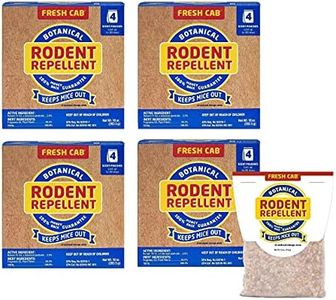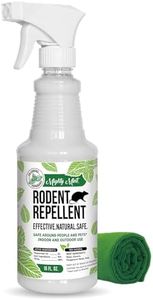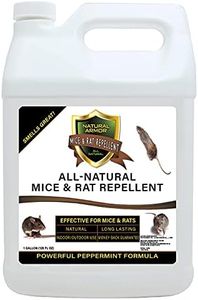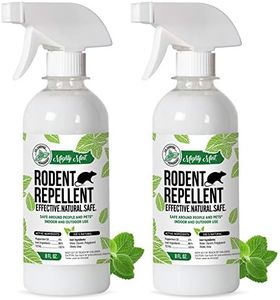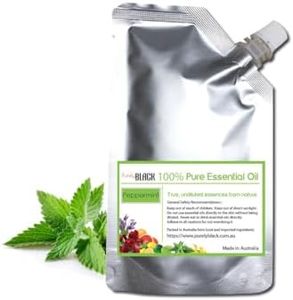We Use CookiesWe use cookies to enhance the security, performance,
functionality and for analytical and promotional activities. By continuing to browse this site you
are agreeing to our privacy policy
7 Best Rodent Spray
From leading brands and best sellers available on the web.By clicking on a link to a third party's website, log data is shared with that third party.
Buying Guide for the Best Rodent Spray
When it comes to choosing a rodent spray, the goal is typically to either repel or eliminate rodents from your home, garden, or workplace. The perfect product for you will depend on your specific situation—whether you need a powerful solution for an infestation or a gentle repellent for prevention. Understanding the main features and differences between rodent sprays will help you make a more informed decision that fits your needs while keeping everyone, including pets and children, safe.Type of Spray (Repellent vs. Killer)The most basic distinction between rodent sprays is whether they repel rodents or kill them. Repellents use scents or tastes that are unpleasant to rodents, keeping them away from treated areas without harming them. Killers, on the other hand, contain substances intended to be lethal if ingested or contacted. Think about whether you want to prevent rodents from entering or actively eliminate an ongoing infestation—this will steer you toward the right type. Use repellents for minor problems or prevention, especially if you prefer non-lethal solutions, and choose killers for severe infestations where fast elimination is required.
Chemical Composition (Natural vs. Synthetic)Rodent sprays can be made with natural oils (like peppermint or cinnamon) or synthetic chemicals. Natural options are generally safer for pets, children, and the environment, but may be less potent and require more frequent application. Synthetic sprays tend to be stronger and longer-lasting, suitable for persistent problems, but they can be toxic and should be used carefully. Your choice should depend on your household—if you have small kids or pets, natural sprays offer peace of mind, while tough cases in less-sensitive areas can be tackled with synthetic formulas.
Area of CoverageThis is about how much space a single bottle of spray can protect or treat. Some sprays are designed for small, targeted areas like cupboards, while others are formulated for large rooms, basements, or even outdoor spaces. Coverage varies by concentration and bottle size, so check packaging details. If you need to treat a large area, choose a product that’s labeled for broader coverage, but for pinpoint problems, a focused spray will do.
Safety for Humans and PetsSafety is very important, especially in homes with children or animals. Some rodent sprays are labeled as pet and child safe, while others warn against use in areas accessed by non-target animals or people. Always read product information carefully—if you need to spray in kitchens, living spaces, or pet areas, seek out sprays with natural ingredients and explicit safety labels. If safety isn’t a concern (like using sprays in attics or garages), your options expand.
Odor and ResidueDifferent sprays have different smells, which can be strong and lingering or mild and quickly dissipating. Some natural sprays have pleasant herbal scents people enjoy, while potent chemicals can be irritating. Residue also matters—some leave spots or films that need to be wiped up, while others dry clear. Think about where you’ll use the spray; public rooms, kitchens, and bedrooms usually benefit from low-odor, non-marking options, while garages and sheds are less sensitive.
Ease of ApplicationRodent sprays come in various bottles—pump sprays, aerosols, or even concentrates to mix with water. An easy-to-use spray bottle is convenient for most users, while concentrates might suit people treating large areas or who don’t mind preparing solutions. Pick something you’ll actually use as needed—the simpler and more convenient, the better, especially if you’ll need to reapply the spray regularly.
